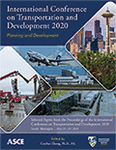International Conference on Transportation and Development 2020
Energy Consumption Analysis for Parallel PHEVs with Identifying Working Modes Based on Real-World Longitudinal Travel Data
Publication: International Conference on Transportation and Development 2020
ABSTRACT
In order to better understand the energy consumption performance of parallel plug-in hybrid electric vehicle (PHEV) and to analyze the impact factors under the hybrid driving mode, the working modes are identified for more accurate energy consumption analysis with real-world travel data. The methodology for identifying the different working modes is proposed. An unobserved fixed effects model is used to analyze the effects of different factors on energy consumption rate (ECR), such as state of charge (SOC), speed, time, and surrounding environment. Based on the real-world longitudinal travel data of 425 PHEVs in Shanghai with more than 300,000 trips, the results show that the ECR of the sample PHEVs saves up to 19.3% compared to the conventional gasoline vehicle Toyota Corolla. Compared with the BEV Citroen C-Zero, the ECR is 2.96 times of it. It is concluded that the ECR derived from our research based on real-world travel data is more accurate and comparable in different dimensions from the methods used by most of researchers, thus is very meaningful for the public to be informed of the energy consumption performance of vehicles.
Get full access to this article
View all available purchase options and get full access to this chapter.
REFERENCES
“EPA fuel economy.” <https://www.fueleconomy.gov>(Aug. 1, 2019).
Alvarez, R. and M. Weilenmann (2012). “Effect of low ambient temperature on fuel consumption and pollutant and CO2 emissions of hybrid electric vehicles in real-world conditions.” Fuel 97: 119-124.
Brundell-Freij, K. and E. Ericsson (2005). “Influence of street characteristics, driver category and car performance on urban driving patterns.” Transportation Research Part D 10(3): 213-229.
Davies, J. and K. S. Kurani (2013). “Moving from assumption to observation: Implications for energy and emissions impacts of plug-in hybrid electric vehicles.” Energy Policy 62: 550-560.
Fetene, G. M., C. G. Prato, S. Kaplan, S. L. Mabit and A. F. Jensen (2017). “Harnessing Big-Data for Estimating the Energy Consumption and Driving Range of Electric Vehicles.” Transportation Research Part D Transport & Environment 54: 1-11.
Fontaras, G., P. Pistikopoulos and Z. Samaras (2008). “Experimental evaluation of hybrid vehicle fuel economy and pollutant emissions over real-world simulation driving cycles.” Atmospheric Environment 42(18): 4023-4035.
Hu, H. (2009). “The Present Situation of Plug-in Hybrid Electric Vehicle.” People’s Public Transportation (7): 43–44.
Jin, Y., P. Zang and Z. Wang (2018). “Working Mode Identification and Energy Consumption Analysis Based on PHEV Operation Data.” Chinese Journal of Automotive Engineering 8(5): 358-365.
Liu, Z., Q. Meng and S. Wang (2013). “Speed-based toll design for cordon-based congestion pricing scheme.” Transportation Research Part C Emerging Technologies 31(2): 83-98.
Lohse-Busch, H., M. Duoba, E. Rask, K. Stutenberg, V. Gowri, L. Slezak and D. Anderson (2013). Ambient Temperature (20°F, 72°F and 95°F) Impact on Fuel and Energy Consumption for Several Conventional Vehicles, Hybrid and Plug-In Hybrid Electric Vehicles and Battery Electric Vehicle. SAE 2013 world congress and Exhibition: April 16-18, 2013, Detroit, Michigan, USA. Detroit(US): 12220-12251.
Plotz, P., S. A. Funke and P. Jochem (2018). “Empirical Fuel Consumption and CO2 Emissions of Plug-In Hybrid Electric Vehicles.” Journal of Industrial Ecology 22(4): 773-784.
Wu, D., D. C. Aliprantis and K. Gkritza (2010). “Electric Energy and Power Consumption by Light-Duty Plug-In Electric Vehicles.” IEEE Trans Power Syst 26(2): 738-746.
Wu, X., M. Aviquzzaman and Z. Lin (2015). “Analysis of plug-in hybrid electric vehicles’ utility factors using GPS-based longitudinal travel data.” Transportation Research Part C-emerging Technologies 57: 1-12.
Wu, X., J. Dong and Z. Lin (2014). “Cost analysis of plug-in hybrid electric vehicles using GPS-based longitudinal travel data.” Energy Policy 68: 206-217.
Zahabi, S. A. H., L. Miranda-Moreno, P. Barla and B. Vincent (2014). “Fuel economy of hybrid-electric versus conventional gasoline vehicles in real-world conditions: A case study of cold cities in Quebec, Canada.” Transportation Research Part D Transport & Environment 32: 184-192.
Zoepf, S., D. Mackenzie, D. R. Keith and W. Chernicoff (2013). “Charging Choices and Fuel Displacement in a Large-Scale Demonstration of Plug-In Hybrid Electric Vehicles.” Transportation Research Record 2385(2385): 1-10.
Information & Authors
Information
Published In
International Conference on Transportation and Development 2020
Pages: 345 - 355
Editor: Guohui Zhang, Ph.D., University of Hawaii
ISBN (Online): 978-0-7844-8316-9
Copyright
© 2020 American Society of Civil Engineers.
History
Published online: Aug 31, 2020
Published in print: Aug 31, 2020
Authors
Metrics & Citations
Metrics
Citations
Download citation
If you have the appropriate software installed, you can download article citation data to the citation manager of your choice. Simply select your manager software from the list below and click Download.
